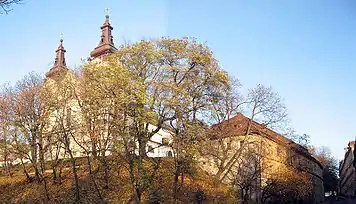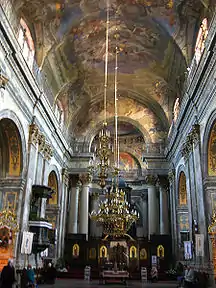Carmelite Church, Lviv
The Carmelite Church in Lviv was first mentioned in 1634 as the church of the monastery of the Barefoot Carmelites. In 1748 it was the scene of a notorious scuffle ("monomachia") between the Carmelites and their neighbours, the Capuchins.
The suburban location caused the church to be rather well fortified, yet it was ravaged by the Cossacks in the Khmelnytsky Revolt and the Swedes in the Great Northern War. The entire façade was redesigned in the 19th century.
Still, the building retains much of its original character and design, attributed to architect Jan Pokorowicz. Especially noteworthy are the 300-year-old black marble altar and a series of frescoes executed by Giuseppe Pedretti in the 1730s.
After 1789 the church has passed through a succession of owners, ending with the Ukrainian Greek Catholic Church which reconsecrated the church to Michael the Archangel in 1991.
 |
 |
 | ||
| The former Carmelite church, as seen from the Powder Tower | The remaining monastery fortifications | The interior |
References
- Островский Г. С. Львов. Издание второе, переработанное и дополненное. Ленинград: Искусство, 1975. С.113.
- Памятники градостроительства и архитектуры Украинской ССР. Киев: Будивельник, 1983—1986. Том 3, с. 78.
